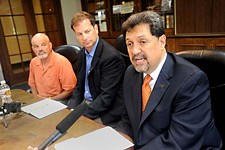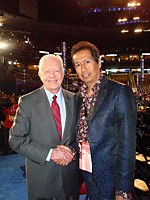Back to the Drawing Board
Council rejects proposals for the creation of city music and arts departments
By Wells Dunbar, Fri., May 22, 2009
City Council supporters of the Live Music Task Force – and its chief recommendation, creation of a city music department – found themselves in the odd position last week of asking city staffers to spend less money on the initiative or to shrink their proposals.
City Manager Marc Ott's chief of staff, Anthony Snipes, presented three options for assisting the music and arts communities. The first (and most expensive) would create two separate departments: the Department of Arts, Culture, and Creativity, as recommended by last year's CreateAustin report, and the Department of Music. The total cost – including one-time expenses for the twin departments – would be more than $11 million. By moving funding from other city departments involved in the arts – such as the Economic Growth and Redevelopment Services Office, which oversees city arts programs, or the Parks & Recreation Department, which administers venues like the Dougherty Arts Center – the city would be able to ameliorate the bulk of the cost. However, that would still leave more than $2.5 million unfunded – a tough request in flush times but impossible now.
The second option would create one department but install two separate offices in it, one for arts and culture and one for music. Although scaled back, this option would still require $2.1 million in costs. The third option would simply create a dedicated music division in the Economic Growth and Redevelopment Services office. A sound engineer and a music program coordinator would report to a music division manager; additionally, a film program coordinator position would be created. Brewster McCracken bristled when shown a flow chart placing the position under an arts heading; he reminded Snipes that council policy mandates putting film programs under economic growth departments, due to the film industry's economic impact on the city. McCracken was later assured that was in fact where the film position would remain, but his disappointed read of the recommendations reflected general council dissatisfaction.
To put it simply, it seemed like staff didn't get it – instead offering expensive recommendations that would bloat city bureaucracy. (Under the first option, the independent Music Department would've come bundled with its own budget staffer and public information officer – not exactly highlights of the Live Music Task Force's recommendations.) Saying, "a lot of those recommendations missed the point," McCracken – who recently ran his mayoral campaign plugging growth in the music and digital-entertainment sectors – also asked about a recommended sound engineer position for someone who would enforce decibel limits. He wondered whether that code-enforcement function belonged in the department or whether its costs could be offset from another code-enforcing department. All in all, McCracken thought the recommendations needed to be "vastly stripped down."
Mike Martinez, whose aide, Bobby Garza, was deeply involved in the Live Music Task Force, concurred. Instead of an "all or nothing" type of proposition – where a department couldn't be created without all the concomitant bureaucracy – Martinez suggested the city "get a little surgical" in sussing out what's needed and what isn't. Citing the example of the city's Transportation Department, which was created in 2008 with a minimum of additional bureaucracy, Martinez was ultimately optimistic that something could be done; he said he thought the city could find at least $300,000 from other departments to work toward both an arts and a music department.
Going into the meeting, background chatter seemed focused on whether council would be giving short shrift to the cultural arts community; despite what you'd think given the recent visibility of the Live Music Task Force, council directed the city manager to explore the feasibility of an arts and culture department back in June 2008, as part of the city-commissioned CreateAustin initiative. However, as the staff presentation made clear, both communities have a way to go – and require further action and support from their members – before they're officially ensconced in the city.
Got something to say on the subject? Send a letter to the editor.











